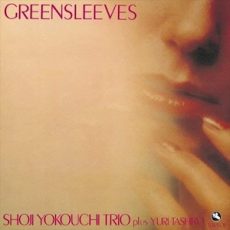
Requisites
Greensleeves ~ Shoji Yokouchi Trio plus Yuri Tashiro | By Eddie Carter
I was looking for something interesting to play at the start of my Tuesday morning when I came across an album by the Shoji Yokouchi Trio and Yuri Tashiro. Greensleeves (Three Blind Mice TBM-5011) is a 1978 release with a program of four jazz standards and three creative originals. The personnel consists of Yuri Tashiro on Hammond organ (tracks A1 to A4, B3), Shoji Yokouchi on folk guitar (tracks A1, A2), electric guitar (tracks A4, B1, B2), and gut guitar (tracks A3, B3), Kunimitsu Inaba on bass, and Hajime Ishimatsu on drums. The copy I own is the 2017 Impex Records U.S. Limited Edition stereo audiophile reissue, sharing the original catalog number. No. 2581 of 3000.
Side One opens with Willow Weep For Me by Ann Ronnell. Shoji’s gentle introduction gets things off to a good start for the quartet’s slow-paced melody. Shoji has the first say and tenderly embraces the opening solo. Yuri follows with a thoughtfully passionate reading, while Kunimitsu and Hajime complement both elegantly into the theme’s reprise and finale. Bobby Timmons’ Moanin’ affords everyone solo space beginning with the quartet’s happy, upbeat theme. Shoji takes the song’s first lively reading, then Yuri makes her presence felt with skillful assurance. Kunimitsu follows with a brief statement, and Shoji and Hajime share a short exchange, preceding the closing chorus and vibrant climax.
Misty by Erroll Garner and Johnny Burke begins with Shoji setting the stage as he leads the ensemble through the gorgeous theme. He continues to reveal his lyrical side in a delicate opening statement. Yuri then enhances the song’s charm with a graceful interpretation. Kunimitsu and Hajime contribute the romantic, disciplined accompaniment, leading into the reprise and a soothing finale. The first of three compositions by Shoji Yokouchi, Drink Up, Vodka Martini, features the guitarist in a playful mood throughout the introduction and melody. As the song’s only soloist, Shoji conveys a driving vitality that bounces along, and the band’s chemistry shines, supporting him ahead of the melody’s restatement.
New Orleans Sunday is a trio performance featuring Shoji, Kunimitsu and Hajime. The trio puts the song through its paces with a catchy melody out of the gate. Shoji launches the opening with a driving rhythm, then Kunimitsu mines a vein of unsuspected riches in the following solo. Shoji and Hajime add a tasty treat in a short conversation before the trio’s reprise and conclusion. Greensleeves begins with a haunting intro, before picking up pace for the trio’s theme. Shoji takes the lead solo in a series of infectiously propulsive choruses. Kunimitsu goes for a lightly swinging walk next, then Hajime enters the spotlight to give a brief workout, leading back to the ending theme and soft summation.
Your Watch Is Ten Minutes Slow picks up the tempo one final time to wrap up the album. The quartet’s agile melody starts things off, then Shoji gets down to business on the opening solo. Yuri responds with a spirited reading ahead of the foursome’s return to the theme and close. Takeshi Fujii produced the initial session, and Yoshihiko Kannari managed the recording console. Bernie Grundman mastered this audiophile reissue, and Chris Bellman engineered it. The reissue features a thick cardboard cover; the sound quality is excellent, with a spacious, clear, and detailed soundstage. The record was pressed on 180-gram audiophile vinyl and is silent until the music begins.
Shoji Yokouchi recorded 46 albums over his career, and Yuri Tashiro released 51 titles over her career. If you’re in the mood for an album that weaves together beloved jazz standards with fresh, creative compositions, I invite you to check out Greensleeves by the Shoji Yokouchi Trio and Yuri Tashiro, the next time you’re out record-shopping. It’s an excellent place to start discovering the music of both artists. A delightful album that’s perfect for late-night listening and is sure to please any jazz enthusiast and fans of guitar and organ-centered ensembles!
~Misty, Moanin’, Willow Weep For Me – Source: JazzStandards.com ~ Greensleeves – Source: Wikipedia.org © 2026 by Edward Thomas Carter
More Posts: choice,classic,collectible,collector,guitar,history,instrumental,jazz,music,organ
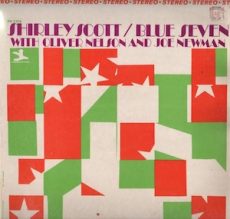
Requisites
Blue Seven ~ Shirley Scott With Joe Newman and Oliver Nelson | By Eddie Carter
I was still in a jazz organ mindset after listening to Jimmy Smith when I decided to explore a lesser-known, underappreciated gem by Shirley Scott. Blue Seven (Prestige PR 7376/PRST 7376) was recorded in 1961, yet remained on the shelf until its 1965 release. For her fourteenth album, Shirley’s working with an outstanding ensemble: Joe Newman on trumpet, Oliver Nelson on tenor sax, George Tucker on bass, and Roy Brooks on drums. Together, they create a jazz session that’s laid-back and refined, filled with understated groove and energy. Unlike some organists who favor a bold, party-heavy approach, Shirley brings a softer, blues-influenced touch, letting her organ blend with the ensemble rather than dominating it. My copy of this album is the 1965 U.S. stereo release.
Side One opens with the title tune, Blue Seven by Sonny Rollins. George and Roy’s soulful, bluesy introduction eases into the quintet’s mellow theme. Joe opens gently and evolves into a warm, inviting interpretation. Oliver explores intriguing avenues in the following reading. Shirley showcases her expressive touch and impressive technique until the group returns for the finale. Don’t Worry ‘Bout It Baby, Here I Am by Shirley Scott starts on a bright note with the horns merging into the rhythm section’s cheerful melody. Scott opens the first solo with some good, honest soul. Nelson follows with a relaxing performance, then Newman delivers a soothing interpretation that gradually builds to a few final thoughts by Scott before the song ends.
Nancy (With The Laughing Face) by Phil Silvers and Jimmy Van Heusen gently shifts the album’s pace to a tender ballad. Shirley’s delicately gentle melody creates a soft, inviting backdrop for both horns. She then caresses each note of the song’s only solo with elegance and deep emotion, leading to the ensemble’s touching ending. Wagon Wheels by Billy Hill and Peter DeRose was the title tune of the 1934 Western film. Newman steps forward with his muted trumpet, guiding the ensemble through the easygoing melody. Nelson makes a brief, tasteful entrance before Newman continues the mellow mood. Nelson follows with smooth, unhurried lines, then Scott delivers a reading as comforting as a hearty, satisfying meal, before the quintet returns for the closing chorus and gentle fadeout.
The album closer is Give Me The Simple Life, by Rube Bloom and Harry Ruby, kicking off with the quintet’s bright, upbeat melody. Oliver steps forward first to deliver a spirited and swinging interpretation. Joe maintains the momentum in an energetic statement, and then Shirley’s robust performance leaves a lasting impression. All three soloists trade upbeat ideas, leading to the ensemble’s closing chorus. Esmond Edwards supervised the album, and Rudy Van Gelder was behind the dials. The album’s excellent sound quality transports the listener into the heart of the quintet’s lively interaction, with warm, crystal clear acoustics that create the sensation of a live performance happening right in your listening room.
If you love jazz groups that feature the Hammond organ up front and blend the lively drive of hard bop with the soulful rhythms of soul jazz, I offer for your consideration, Shirley Scott’s Blue Seven, the next time you’re out record shopping. This album is a delightful listen, filled with inventive solos and tight group interplay. You’ll experience everything from the upbeat energy of Don’t Worry ‘Bout It Baby, Here I Am and Give Me The Simple Life, to the relaxed swing of Blue Seven and Wagon Wheels, as well as the tender emotion of Nancy (With The Laughing Face). After you spin it on the turntable, it’s likely to earn a permanent spot among the favorites in your library, encouraging you to return to it again and again!
~ Give Me The Simple Life, Nancy (With The Laughing Face), Wagon Wheels – Source: Wikipedia.org
p>© 2025 by Edward Thomas Carter
More Posts: choice,classic,collectible,collector,history,instrumental,jazz,music,organ,saxophone,trumpet
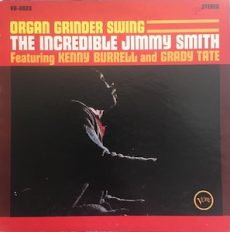
Requisites
Organ Grinder Swing ~ Jimmy Smith With Kenny Burrell and Grady Tate | By Eddie Carter
This morning’s selection from the library holds a special significance to me. It was one of my mom’s favorite albums to play while enjoying her morning coffee and preparing our Sunday dinners when we were younger. Organ Grinder Swing (Verve Records V-8628/V6-8628) is a terrific trio album by Jimmy Smith, with Kenny Burrell on guitar and Grady Tate on drums. It was his second most successful album, surpassed only by Back at the Chicken Shack. The soulful character of his organ playing had a profound impact on me from the moment I first heard Houseparty and The Sermon. I quickly became a devoted fan, growing to appreciate even more the rich musicality and infectious grooves he brought to every performance. My copy of this album is the original 1965 U.S. deep groove stereo release.
The title track, The Organ Grinder’s Swing by Will Hudson, Irving Mills, and Mitchell Parish, kicks off the first side with Jimmy’s infectious enthusiasm on a swinging theme. Kenny builds the opening solo with some home-cooking. The organist steps up next with a spirited statement, and Jimmy’s vocal comments as it unfolds. Grady provides a steady beat that propels the group into the climax. Oh, No, Babe by Jimmy Smith gets this soulful blues underway with Smith’s organ and vocals, which are inserted during the introduction and melody. Burrell’s gentle touch shines in a refined, inviting opening solo. Smith brings a Southern flair to the proceedings with a down-home, tasteful delight ahead of the song’s conclusion.
Blues For J by Jimmy Smith is a bluesy mid-tempo original that opens with the trio’s joyously carefree theme in unison. Kenny takes center stage, showcasing his guitar artistry in the opening solo. Jimmy extends the happy mood with a vibrant performance, leading the group back to the ensemble’s reprise and a satisfying finish. The trio delivers a unique take on Greensleeves, the beloved English folk tune. Smith begins the melody with gospel-tinged musical ideas that give the melody a fresh sense of soulfulness. Burrell launches the opening statement with a laid-back, smooth groove. Smith then takes command, delivering an energetic and spirited interpretation that continues until the group’s theme reprise gradually dissolves, like autumn leaves drifting to the ground.
I’ll Close My Eyes by Buddy Kaye and Billy Reid is gently introduced by the trio, segueing into a graceful melody. Kenny’s opening statement radiates a comforting elegance and is one of his most beautiful moments on the album. Jimmy then guides the group toward the song’s reprise, incorporating sensitive ideas and a warm, refined tone, until the ensemble brings back the theme. Satin Doll by Duke Ellington, Johnny Mercer, and Billy Strayhorn is one of the most frequently recorded jazz standards, and picks up the beat one final time for the trio’s light-hearted theme. Burrell looks back nostalgically and sparkles with a soulful touch in the opening solo. Smith responds by gliding efficiently over the keys in a closing statement of happiness while Tate keeps the tempo lively and upbeat ahead of the finish.
Creed Taylor produced Organ Grinder Swing, and Rudy Van Gelder handled the recording. While the album’s sound quality is a strong effort, it falls short of the very best due to a harshness in the microphone placement at the organ, which is especially notable on The Organ Grinder’s Swing, Blues For J, and Greensleeves. This technical flaw, however, does not diminish from the album’s overall excellence. So, don’t let that deter you from adding this record to your library. The album’s greatest strength to me is how impeccably the trio works together. Kenny Burrell and Grady Tate perfectly complement Jimmy Smith throughout every track with a flawless sense of rhythm. If you aren’t looking at the cover, you could easily mistake this for one of the organist’s classic Blue Note recordings.
For fans of the jazz organ or those just discovering the music of Jimmy Smith, I invite you to check out Organ Grinder Swing the next time you’re visiting your favorite record shop. It perfectly captures the dynamic spirit and sophisticated musicianship that emerges when three exceptional performers unite, resulting in a memorable showcase of rhythm, style, and collaboration!
~ Back at the Chicken Shack (Blue Note BLP 4117/BST 84117), Houseparty (Blue Note BLP 4002/BST 84002), The Sermon (Blue Note BLP 4011/BST 84011) – Source: Discogs.com ~ Satin Doll – Source: JazzStandards.com ~ Greensleeves, I’ll Close My Eyes, The Organ Grinder’s Swing – Source: Wikipedia.org © 2025 by Edward Thomas Carter
More Posts: choice,classic,collectible,collector,history,instrumental,jazz,music,organ
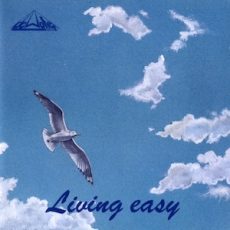
Daily Dose Of Jazz…
Andrew James Quin was born August 12, 1960 in London, England. Not from a musical family, he was offered a scholarship to study classical piano at the Royal College of Music, but turned down the place in order to pursue his growing interests in improvisation, composition and music technology.
He works in TV and film and his music has appeared in Hollywood movies, advertising campaigns, and television programs. His work has appeared in British TV shows such as Coronation Street and Holby City.
Pianist, theatre organist and composer Andy Quin, who has well over one thousand published tracks, continues to perform, compose and record.
More Posts: bandleader,composer,history,instrumental,jazz,music,organ,piano
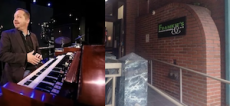
PAT BIANCHI
Organist Pat Bianchi has established himself as one of the premier organists on the international scene today. Bianchi is the winner of Downbeat Magazine’s 2016 rising star poll, Hot House 2019 poll and nominee of the 2024 Jazz Journalists Association as Keyboardist of the year. Known for fearlessly taking the jazz organ into new and exciting directions, Pat’s playing blends tradition with forward-thinking creativity, drawing inspiration from mentors Dr. Lonnie Smith and Joey DeFrancesco.
With a career that includes touring with Steely Dan, performing alongside jazz icons Pat Martino and Lou Donaldson, and leading his own acclaimed trio, Pat’s artistry is unmatched! His command of the instrument, harmonic prowess, rhythmic intensity and versatility are rivaled by few. Bianchi’s nine albums as bandleader, together with over 35 credits as a featured sideman and his Grammy Nomination have solidified his place at the forefront of today’s Jazz Organists.
Bandmates: Cory Weeds – tenor saxophone | John Lee – drums
Cover: $20.00 ~ $25.00 +fee
More Posts: adventure,bandleader,club,genius,jazz,music,organ,preserving,travel




